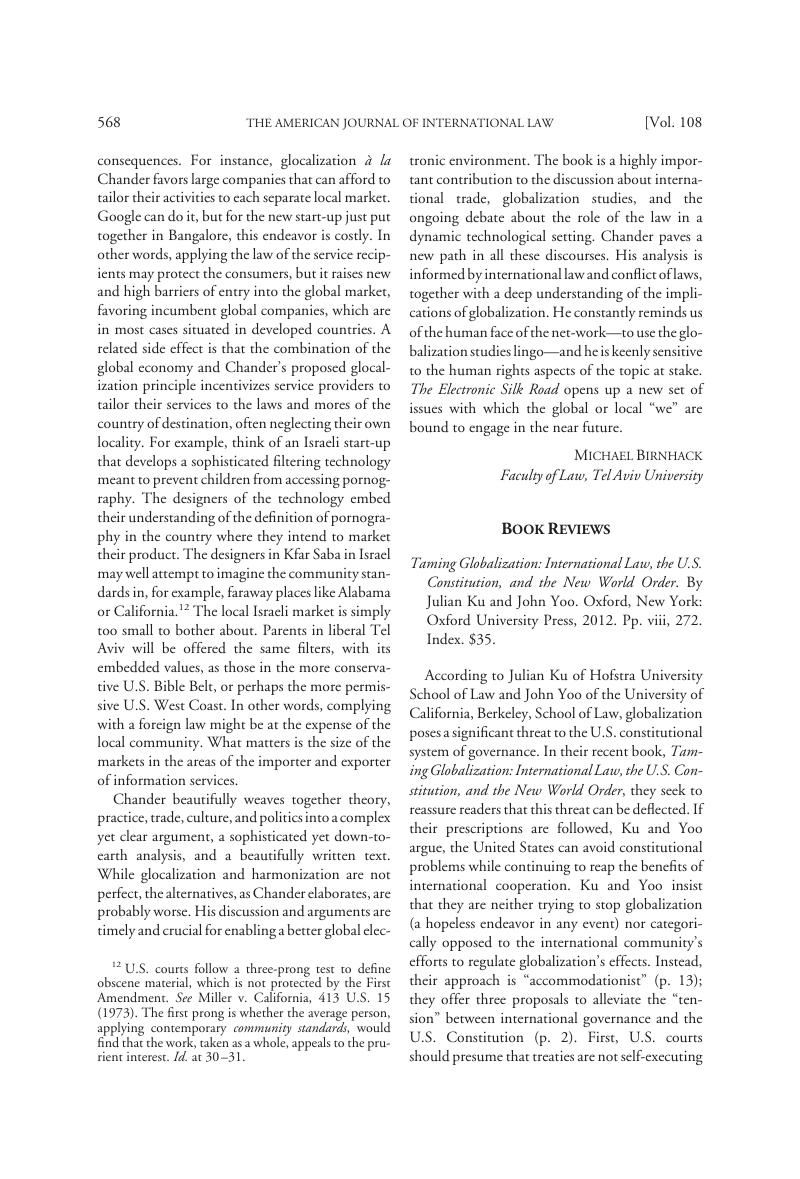No CrossRef data available.
Published online by Cambridge University Press: 20 January 2017

1 North American Free Trade Agreement,, U.S.-Can.-Mex., Art. 1904(11), Dec. 8, 1992, 32 ILM 605, 683 (1993) [hereinafter NAFTA].
2 Ku and Yoo acknowledge this consequence: “It is true that non-self-execution raises the transaction costs of making international agreements with domestic effect” (p. 107). And they further note: “It seems undeniable that following the basic forms of domestic law making—congressional control over legislation, presidential leadership in interpretation, or maintaining the interstitial nature of federal law against a back ground of state lawmaking—creates more arduous requirements for creating International Law and organizations” (p. 258). But their functional analysis disregards these costs entirely.
3 Dalton, Robert E., United States, in National Treaty Law and Practice 765, 789 (Hollis, Duncan B., Blakeslee, Merritt R. & Ederington, L. Benjamin eds., 2005).Google Scholar
4 E.g., Convention Providing a Uniform Law on the Form of an International Will, Oct. 26, 1973, S. Treaty Doc. No. 99-29 (1986), 12 ILM 1298 (1973), available at http://www.unidroit.org/instruments/succession [hereinafter Washington Convention]; Basel Convention on the Control of Transboundary Movements of Hazardous Wastes and Their Disposal, Mar. 22, 1989, 1673 UNTS 57, 28 ILM 657 (1989); Daugirdas, Kristina & Mortenson, Julian Davis, Contemporary Practice of the United States Relating to International Law, 108 AJIL 532, 533 (2014)Google Scholar; see also Hathaway, Oona A.,Treaties’ End: The Past, Present, and Future of International Lawmaking in the United States, 117 Yale L.J. 1236, 1313 n.225 (2008)CrossRefGoogle Scholar; Staff of S. Comm. on Foreign Relations, 106th Cong., Treaties and Other International Agreements:The Role of the United States Senate 20 (Comm. Print 2001), available at http://www.gpo.gov/fdsys/pkg/CPRT-106SPRT66922/pdf/CPRT-106SPRT66922.pdf (“Treaties approved by the Senate have sometimes remained unfulfilled for long periods because implementing legislation was not passed.”).
5 In their conclusion, Ku and Yoo briefly suggest that their proposals may facilitate international cooperation by making the United States’ international commitments more credible and sustainable by involving more political actors (specifically Congress and state governments) in implementing the U.S. obligations. Ku and Yoo’s proposals are at best only partially aimed at making the United States’ international obligations harder to breach, however. Their proposals regarding CIL and state autonomy facilitate violations of international law, rather than deter them. Moreover, it is not clear that a non-self-executing treaty coupled with implementing legislation is harder to breach than a self-executing treaty. Because of the last-in-time rule, ordinary legislation can override both kinds of treaties.
6 Vienna Convention on Consular Relations, Apr.24, 1963,21UST77, 596 UNTS 261 [hereinafter VCCR].
7 Medellín v. Texas, 552 U.S. 491 (2008); see also Agora : Medellín, 102 AJIL 529 (2008).
8 VCCR, supra note 6, Art. 36.
9 Avena and Other Mexican Nationals (Mex. v. U.S.), 2004 ICJ Rep. 12 (Mar. 31).
10 Medellin, 552 U.S. at 532.
12 see Brief for the United States as Amicus Curiae Supporting Petitioner at 8–9, Medellín v. Texas, 552 U.S. 491 (2008) (No. 06-984), available at http://www.justice.gov/osg/briefs/2006/2pet/5ami/2006-0984.pet.ami.pdf
12 Id. at 5.
13 Medellin, 552 U.S. at 532.
14 see Daugirdas, Kristina & Mortenson, Julian Davis, Contemporary Practice of the United States, 108 AJIL 322, 324 (2014)Google Scholar.
15 U.S. Dep’t of State Press Statement, Execution of Mexican National Edgar Arias Tamayo, Statement of Marie Harf, Deputy Department Spokesperson (Jan. 23, 2014), at http://www.state.gov/r/pa/prs/ps/2014/01/220546.htm.
16 As Ku and Yoo note, “Deliberation also has its potential costs, including delay in decision, but the context of setting domestic rules of general application on questions such as criminal procedure may not incur high costs in this area” (p. 208).
17 Washington Convention, supra note 4.
18 Sprankling, John G., The Emergence of International Property Law, 90 N.C. L. Rev. 461, 483–84 (2012)Google Scholar.
19 Washington Convention, supra note 4.
20 see Letter of Transmittal, Convention Providing a Uniform Law on the Form of an International Will, S. Treaty Doc. No. 99-29, 1973 UST lexis 321 (July 2, 1986), available at http://www.cabinetchone.com/message.
21 137 Cong. Rec. S12131 (daily ed. Aug.2,1991).
22 Washington Convention,supra note 4, Art. I(1) & Annex Art. 1 (noting that “[a] will shall be valid as regards form, irrespective particularly of the place where it is made, of the location of the assets and of the nationality, domicile or residence of the testator, if it is made in the form of an international will complying with the provisions set out in Articles 2 to 5 hereinafter”).
23 Convention on the Prohibition, Production, Stockpiling and Use of Chemical Weapons and on Their Destruction, Jan. 13, 1993, S. Treaty Doc. No. 103-21 (1993), 32 ILM 800 (1993).
24 see NAFTA, supra note 1 and accompanying text.
25 19 U.S.C. §1516a(g)(2).
26 Joined by two other justices, Justice Antonin Scalia endorsed federalism limitations in his concurring opinion in Bond v. United States, 134 S.Ct. 2077, 2098–102 (2014) (Scalia, J., concurring); see also, e.g., Curtis A. Bradley, International Law in the U.S. Legal System 97–137 (2013); Daugirdas, Kristina, International Delegations and Administrative Law, 66 MD. L. Rev. 707 (2007)Google Scholar.